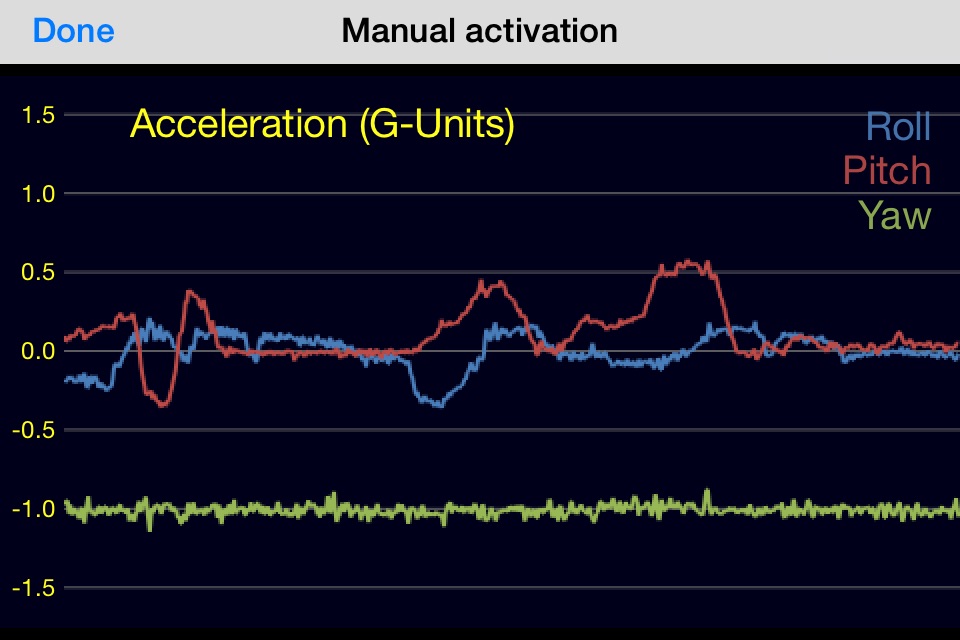
Personal IDR is an incident data recorder built into your phone, designed primarily for use in cars to record the events and behaviour of the car when an incident takes place. This information is invaluable when explaining what happened during an incident. For example in a collision scenario it could show that you did stop at that intersection, or it could show that you were not driving at excessive speed.
For best results the phone should be mounted or positioned* in the car with either of the long edges of the phone perpendicular to the direction of travel. Note that the phone does not have to be level, internal levelling takes care of that aspect. Once positioned in the car, or you are about to drive off, press the reset button (ideally on level ground) to set the calibration of the device to the current pitch and roll of the vehicle. The attitude indicator shows the current orientation of the phone relative to the initial orientation of the phone so you can always check the orientation. If the orientation isnt correct, or if you move the phone within the car, press the reset button again.
In use Personal IDR normally displays a car dashboard (or map of your track) and the mode of operation is similar to custom built devices in common use with many public and private organisations. Personal IDR detects when a significant acceleration event takes place or it can be triggered manually. To trigger manually, simply DOUBLE-TAP on the speedometer. You may want to trigger the device after passing a speed check for example.
When triggered the app records the previous 60 seconds and following 10 seconds of GPS, accelerometer and gyro data at about 50 Hz. It also records up to the last 30 minutes of GPS position data. The data is stored in two CSV files which can be downloaded or forwarded to an email address of your choice. There is also the option to display the results within the app itself and you can create a PDF file of the results. When viewing the result graphs, swipe right to expand the view and swipe left to contract it again. Tapping on each of the graphs displays the next graph in turn. For full and detailed analysis of the incident however you will need to download the CSV files.
Continued use of GPS can significantly reduce battery life so Personal IDR has three power-save options. The first keeps the app fully active at all times which is ideal if you want to keep the dashboard visible. In this mode connecting your phone to a power supply is recommended. There is also an option to allow the screen to dim and suspend updates to the dashboard. Tap the screen once to restore normal brightness and updates. Finally there is an option to allow Personal IDR to move into the background. Data is still recorded however as it is important that you have a continual record of the motion of the vehicle and obviously you cant know in advance when you will require Personal IDR to trigger!
In all power-save modes, the system can shut down GPS if it detects that you are no longer driving. Note that if the system does shut down GPS, it can take a few minutes of driving before it becomes fully operational again. You can however force the system to start GPS immediately by bringing Personal IDR back into the foreground.
Continued use of GPS running in the background can dramatically decrease battery life.
* Please note that if your phone is not positioned in the car with the long edge perpendicular to the direction of travel, or if you dont set the phone by pressing the Reset button, the accelerometer based speed trace is unlikely to match the GPS speed. The Auto-level feature built into the app will attempt to correct for any mismatch but it will work far more effectively if the phone is positioned correctly. Testing on this and other IDR devices has also shown that the GPS speed trace tends to lag the actual speed of the vehicle by about 0.5 to 1.0 seconds.



